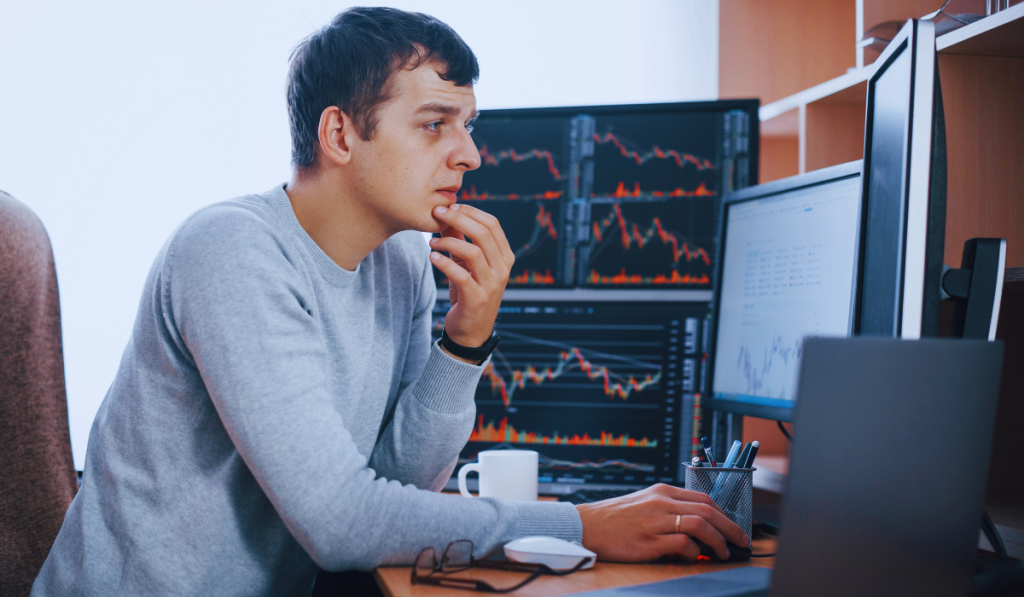How to Start Day Trading? A Comprehensive Guide to Launching Your Trading Career
Although it’s not for the timid, day trading may be a fascinating and possibly profitable endeavor. Many novices enter the world of day trading with the intention of making rapid cash, but they soon learn that it calls for expertise, discipline, and a thorough grasp of the markets. You’ve come to the correct site if you’ve been wondering how to start day trading.
The fundamental procedures, advice, and tactics for beginning day trading will be covered in this article. These fundamental ideas will put you on the right track to being a profitable trader, regardless of whether you want to trade stocks, FX, or cryptocurrency.

Day Trading: What Is It?
It’s important to comprehend what day trading is before we can start learning how to do it. Trading in and out of financial products such as stocks, options, or currencies on the same trading day is known as day trading. Making money by taking advantage of transient market fluctuations is the aim.
In contrast to long-term investment, which involves holding onto assets for years, day traders seek to profit from price changes that occur over a period of minutes, hours, or even a single day. Compared to other types of investment, day trading necessitates a distinct attitude and approach due to its rapid speed.
Learn on Your Own
Education is the first and most crucial stage in day trading. Without a firm grasp of how the markets operate, what influences prices, and how to interpret charts and indicators, you cannot hope to be successful in them.
Learn the fundamentals of market analysis first:
Technical analysis is the process of forecasting future price movements by examining price charts, patterns, and technical indicators. Standard indicators like as moving averages, relative strength indexes, moving average convergence divergence, and candlestick patterns are essential. Understanding the fundamental elements that affect market prices may be quite helpful, even if day traders often concentrate more on technical research. This covers interest rates, business profits, economic news, and geopolitical developments.
Risk management: Taking up excessive risk on a single trade is one of the main errors made
by novice traders. Study risk management strategies such as risk-to-reward ratios, stop-loss orders, and position size. Long-term prosperity depends on capital protection.
To increase your knowledge, spend money on webinars, blogs, books, and courses. For insights, follow seasoned traders or participate in internet trading groups.
Select the Appropriate Instrument and Market
Choosing the appropriate market to trade in is crucial when learning how to start day trading. While some traders just concentrate on equities, others can have a preference for cryptocurrency or forex.
Here is a quick summary of the most popular markets:
Equities: One of the most popular entrance points is day trading equities. Particularly for small-cap firms, stock prices are extremely volatile, which attracts day traders. But stock trading also entails more regulatory monitoring and higher capital requirements.
Forex: The world’s biggest and most liquid market is the foreign exchange market, or forex. The 24-hour market that forex trading may provide allows day traders flexibility. Numerous economic and geopolitical variables impact the currency market, so keeping abreast of global happenings is crucial.
Cryptocurrencies: The market for cryptocurrencies is very new but expanding quickly. Cryptocurrencies might be an exciting option for day traders due to their high volatility and nonstop market hours. However, there is a higher degree of danger because the cryptocurrency market is quite speculative.
Options trading may be quite successful for day traders, but it also provides more sophisticated tactics. But before you go in, you need to learn more about the instrument because the danger is high. Start by learning about the various markets, their volatility, trading hours, and how well they fit your financial objectives and risk tolerance.
Create an account for trading
To start day trading, you must first choose your market and instruments. Then, you must create a brokerage account. Numerous online brokers provide trading platforms with a variety of features and capabilities.
Take into account the following elements while choosing a broker:
Regulation and Reputation: Verify if the broker is subject to local financial authorities’ regulations. This guarantees the safety of your money and holds the broker responsible for supervision.
Trading Fees & Commissions: Since day trading necessitates a lot of trades, commission costs may mount up rapidly. Seek out brokers who provide low costs, particularly if you want to make a lot of trades every day.
Trading Platform: Verify that the broker offers a dependable, user-friendly trading platform that has all the tools required. The most popular platforms used by day traders are MetaTrader, ThinkorSwim, and TradingView.
Customer service: Providing excellent customer service is crucial, particularly for novice traders. Seek out brokers who are known for providing prompt assistance to traders and who offer round-the-clock service.
Create a Trading Plan
Creating a trading strategy is a crucial step in learning how to start day trading. A strategy provides a framework for decision-making, risk management, and increasing your likelihood of success. You’re trading haphazardly without a good plan, which might result in large losses.
Aspiring traders are encouraged by JoinX to begin small, practice consistently, and never stop learning. You can make day trading a useful tool for reaching financial objectives if you are patient and committed. Remain disciplined, keep getting better, and keep in mind that all traders start somewhere. Just taking the initial step is the most crucial.